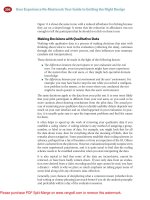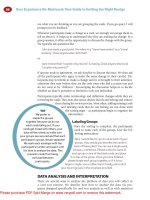Information Liberation: Your Guide to the International Web
Bạn đang xem bản rút gọn của tài liệu. Xem và tải ngay bản đầy đủ của tài liệu tại đây (3.5 MB, 78 trang )
Information
Liberation: Your
Guide to the
International Web
By Jim Rion,
Edited by Justin Pot
This manual is the intellectual property of
MakeUseOf. It must only be published in its
original form. Using parts or republishing
altered parts of this guide is prohibited without
permission from MakeUseOf.com
Think you’ve got what it takes to write a
manual for MakeUseOf.com? We’re always
willing to hear a pitch! Send your ideas to
; you might earn up
to $400.
Table of Contents
Foreword
Government and the Net
International Netting Practicalities
Special Notes For The Expat
Accessing Region-Blocked Media
The Final Word
MakeUseOf
Foreword
Few would argue, I think, that the Internet has
not changed the world dramatically. Every
day we see how free, instantaneous
communication influences politics, social
change, and daily interactions at a
fundamental level. But even with all of this,
there still remains a certain level of
provincialism on the net — Americans stick to
American websites; Japanese stick to
Japanese websites; you get the idea.
Part of this, of course, is due to a simple
language barrier; English is an international
language, but it is by no means the only one.
To some extent this artificial division of the
web is by design. Media producers, like the
BBC, often insist on restricting access to their
products to certain geographical regions to
protect their business models. Distributors
(e.g. iTunes) are complicit in this, or even
instigate it. Even worse, some governments
insist on restricting Internet communication
and blocking access to international websites.
This guide, then, is my small attempt at
helping people deal with all of these
problems. The Internet should connect people
all over the world, not divide them. Whether
you are a backpacker trying to check your
email from a hostel in Denmark, or a college
student trying to get past the Great Firewall
of China, I hope there is some helpful
information in here for you (though if you’re
reading this in China, I doubt you need any
more help. Good job!).
Government and the Net
We’re going to begin this guide with a
discussion of the most vital issue: that of
freedom of expression and governmental
censorship of the Internet. This issue has
become one of the most important of our
time, due to any number of recent political
events, and it certainly bears further
discussion here. We’ll look at some of the
nations with the worst records in this regard,
including a few of the lesser known offenders,
and look at efforts people have taken to
bypass the choking off of information. Of
course, it will also be appropriate for us to
discuss the ramifications, both good and bad,
of those efforts.
National blocking or Censorship
of the Net
The basic nature of the Internet — the pure
transfer of information regardless of location
— clearly creates a threat to groups (for
instance, oppressive dictatorial regimes) that
depend on a weak, ignorant populace for
stability. Allowing people to know about the
outside world might lead to an erosion of the
very status quo that is so important to
preserving illegitimate power. Obviously, true
change comes from a variety of sources, and
it would be foolish to overemphasize the role
of the Internet in regime change like we have
seen in the so-called “Arab Spring.”
At the same time, the behavior of these
regimes toward the Internet clearly implies
the threat they see in it. Numerous nations, all
of them repeatedly tainted by claims of human
rights abuses and political corruption, take
pains to restrict the free use of the Internet
and often go as far as criminalizing efforts to
bypass those restrictions. Of course, even
that has not stopped people hungry for
access to the world’s information.
First, then, let’s look at some of these
countries and what they’ve done to deal with
the problem of the Internet.
1. North Korea
The Hermit Kingdom
has done so much to
earn its name; it almost
boggles the mind.
Information from within
the nation is sparse: the
occasional press
release or intercepted
television broadcast
makes up the bulk of
what we know about what happens inside
North Korea. For an outsider, contact with an
average North Korean citizen is almost
completely unheard of. All of this is purely
intentional on the part of the government, of
course, so it should come as no surprise that,
according to a 2010 New Yorker article, many
North Korean citizens had never even heard of
the Internet, much less had access to it.
There are apparently a few places, like hotels
and PyongYang’s only Internet café, where
satellite Internet access is available — but
only for non-citizens. According to a Korean
Times article, Internet access is completely
outlawed for private citizens of North Korea.
There are apparently government officials
with Internet access, as there is an official
North Korean Twitter account and YouTube
channel, but for most of the businesses and
government offices inside the nation the only
access to a computer network is
“Kwangmyong,” a national intranet connecting
government offices, banks, financial
institutions and other official entities. So, in
other words, North Korea has designed its
own, internal Internet reserved only for the
elite.
2. China
China is, perhaps, the most famous of all
nations on this list when it comes to filtering
the Internet. In contrast with North Korea’s
near total lack of access, China boasts the
largest number of Internet users in the world:
around 513 million people there regularly
access the Internet, more than the entire
population of the USA. (That is still, however,
only about 38% of the population — in the US
nearly 80% of population has access).
One would think, with the Internet growing so
quickly in China, that China would become
increasingly connected to the rest of the
world; but one would be wrong. The Chinese
Internet is very much that: Chinese. Less than
6% of Chinese websites link outside of the
country, and China’s native search engine,
Baidu, is far and away more popular than any
international service.
The government is, naturally, deeply
concerned with keeping this situation as it is.
External Internet access is heavily censored,
both incoming and outgoing. Chinese users
are prevented from accessing external web
addresses using a wide variety of techniques:
DNS filtering and redirection, packet filtering,
IP blocking and more. The effects are not
absolute — there is some access to outside
sites either by accident or design — but even
then the government is watching. For
example, a recent glitch opened up the Great
Firewall to Google+, and users flooded
President Obama’s page with political
comments criticizing the Chinese government
and various policies. Voice of America
questioned the Chinese Foreign Ministry
spokesman Hong Lei:
“He repeated Beijing’s position that it protects
Chinese citizens’ rights to free expression on
the Internet. But he also warned that they
should express themselves according to
Chinese laws and regulations. “
Free, but
3. Iran
Iran has a long history of Internet blocking
and censorship; there are records of the
government choking incoming Internet access
points as far back as 2001. The early weeks
of 2012, though, have seen a large upswing in
Internet censorship, with access to the secure
HTTPS protocol on external sites (such as
Gmail) restricted, forcing users to log into
external services without the extra layers of
privacy and security encryption offers.
Watchdogs like the EFF and OpenNet
Initiative see this escalation as a big step
towards what one Iranian official has called
the “Halal Internet,” a national network
focused on commerce and business and
strongly guarded against “inappropriate”
content — similar to the North Korean
“Kwangmyong” network.
In addition to technological attempts to control
Internet speech, of course, there are the
more direct controls: bloggers and online
activists are routinely detained, harassed and
arrested for expressing views critical of the
regime or otherwise unwelcome ideas online.
Net cafes are required by law to have security
cameras to record users’ visits, and also
record their browsing history and personal
usage information for each computer used.
The atmosphere of control is near absolute.
4. Saudi Arabia
Not to be outdone by nearby Iran, Saudi
Arabia filters a broad spectrum of content.
Much like Iran, Saudi Arabia maintains a
policy of jailing those who use the Internet for
anything smelling of “subversion.” A religious
motivation is clear: much of the filtering is
aimed at sites or content that register as
“immoral” in the strict Sunni nation:
homosexual, women’s rights or pornographic
content are all blocked, as are sites
containing criticism of the Saudi regime or
Islam.
Unlike China, which denies censorship when
directly asked about it, censorship is openly
acknowledged by the Saudi Arabian “Internet
Services Unit,” the agency in charge of
Internet filtering. You can see for yourself at
their English language website. I really
recommend you read that page: it outlines
some very interesting justifications for the
suppression of free speech and information.
Lesser known censorship
The countries above are well known, and
fairly open, about their control of information.
It really shouldn’t come as any surprise that
Iran filters web content, or that North Korea
keeps most people offline altogether.
However, there are other countries which,
while not infamous for online censorship, are
still worth mentioning.
Burma (also known as Myanmar), is certainly
worth consideration here. Internet access
there is extremely limited (less than 1% of
people have any kind of access to the
Internet) due to economic and political
reasons, but the government has announced
plans to increase access throughout the
country.
It did, in fact, lead to
wider use of the net
for the people of
Burma, but there
was a catch. In
2007, during a
period of strong civil
unrest and harsh military crackdowns, the
Internet was used to disseminate information
about the government’s mistreatment of its
people. The government’s response was to
completely shut the net down.
The country has shown some improvement
since transitioning to a new government in
2011, but information about what’s going on
there now is still hard to find.
Turkey is also increasingly prominent in the
free-web discussion. It consistently blocks
access to websites containing information
unwelcome by the Turkish government. For
example: sites pertaining to Turkish Kurdish
populations or labor unions are blocked, as is
YouTube on occasion.
Italy might be a bit of a surprise on this list,
but then again it also isn’t known for its
freedom from corruption or ill-government. In
terms of Internet security and privacy, it
hasn’t reached the outrage-inducing levels of
Iran or China, but at the same time there are
laws on the books which seem completely out
of place in a modern Western democracy.
For example, Internet cafes in Italy are
required to take copies of users’ passports
and submit them, along with usage
information, to police agencies. The same law
requires a periodical, comprehensive list of all
the people in the country who use mobile
phones.
No bloggers are being thrown in jail, but Italy
is not exactly a bastion for Internet freedom.
“Reporters without Borders” releases a yearly
report on “Enemies of the Internet” which has
invaluable information about national
censorship of the Internet. It’s available this
year at this website. I encourage you to read
it; it has some surprising information.
Should We Bypass This
Censorship?
Having seen how so many countries are
engaged in filtering and monitoring Internet
usage within their borders whilst blocking
content from outside, the natural inclination for
geeks and activists alike is to start looking for
ways around it. The fundamental freedom of
the Internet, with its immediacy and its
ubiquity, has become something of a given for
so many of us that it would be hard to imagine
constraining it.
Of course, in an oppressive regime like that of
Iran, the obvious value of being able to
exchange information freely with common
citizens around the world, as well as exposing
the harsh realities of life under such
conditions, should make anyone try to find
ways to break through government controls.
But is that the right thing to do? I’d like to look
at that question in more depth here.
Consequences Of Bypassing National
Censors
First, it is vital to
consider the
ramifications of
breaking national
filtering regulations.
The ideal way would
be to be to do so
anonymously and
have the freedom to
communicate with no
fear of
repercussions, but
the reality is that anonymizing services like
TOR aren’t perfect. There are often ways for
authorities to find out who is saying what
without permission. Then, of course, comes
punishment.
Breaking the law in a country with strict
Internet filtering is no joking matter. It is no
coincidence that the same countries which
appear on the lists of the worst Internet
censors are also the same countries with
repeated and persistent accusations of human
rights abuses. Oppressive censorship is, in
fact, a human rights abuse.
According to a BBC report filed in 2005,
bloggers have been beaten and tortured for
voicing things that the Iranian government
found unacceptable. China also has a long
record of jailing Internet-based dissidents as
does Saudi Arabia.
The consequences are thus very serious for
those wanting to use the Internet to be heard.
Is it worth it? Consider this seriously before
bypassing any filter.
Ethics Of Illegal Bypassing
Oppressing freedom of speech online is not
done in a vacuum: it is typically one part of a
general oppression of human rights. The
nations with the strongest filtering and
monitoring systems are those with the worst
records regarding the treatment of their own
citizens. Often, exposing that mistreatment
and making the realities of oppressive
regimes public is one real step toward
bringing them down.
The government of Burma knows this. That’s
why it took down all access to the Internet in
2007 — to prevent its people from telling the
world what it was doing. That’s why North
Korea and Iran want to create their own,
wholly domestic networks.
The “Arab Spring” of 2011 demonstrated that
the Internet can have a (limited yet real) role
in revolution, though of course the real work
of liberation is done by real people, spilling









